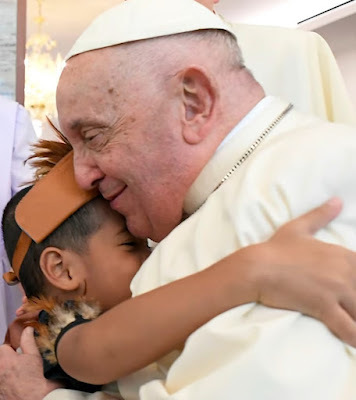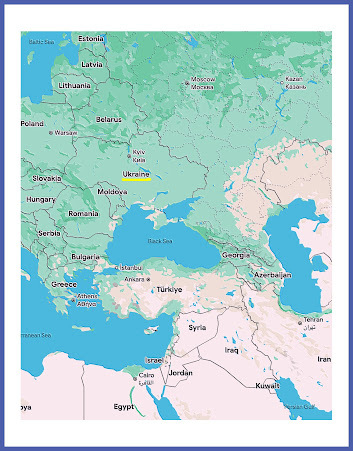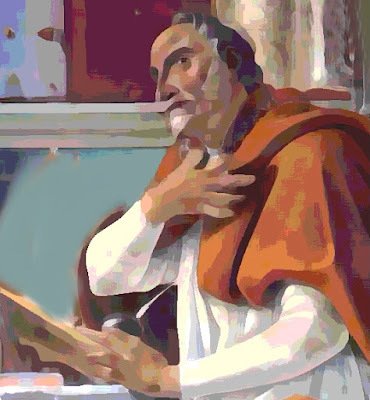John Janaro's Blog, page 25
September 12, 2024
The “Measure” of a Forgiving and Merciful Heart
 Here is the Gospel passage proclaimed at the Eucharistic Liturgy of September 12. I place it here because it is a word from Jesus that I need to read and ponder again and again, and beg Him for the grace of a heart full of God’s generosity, a forgiving and merciful heart:
Here is the Gospel passage proclaimed at the Eucharistic Liturgy of September 12. I place it here because it is a word from Jesus that I need to read and ponder again and again, and beg Him for the grace of a heart full of God’s generosity, a forgiving and merciful heart:Jesus said to his disciples: “To you who hear I say, love your enemies, do good to those who hate you, bless those who curse you, pray for those who mistreat you. To the person who strikes you on one cheek, offer the other one as well, and from the person who takes your cloak, do not withhold even your tunic. Give to everyone who asks of you, and from the one who takes what is yours do not demand it back.
“Do to others as you would have them do to you. For if you love those who love you, what credit is that to you? Even sinners love those who love them. And if you do good to those who do good to you, what credit is that to you? Even sinners do the same. If you lend money to those from whom you expect repayment, what credit is that to you? Even sinners lend to sinners, and get back the same amount. But rather, love your enemies and do good to them, and lend expecting nothing back; then your reward will be great and you will be children of the Most High, for he himself is kind to the ungrateful and the wicked. Be merciful, just as also your Father is merciful.
“Stop judging and you will not be judged. Stop condemning and you will not be condemned. Forgive and you will be forgiven. Give and gifts will be given to you; a good measure, packed together, shaken down, and overflowing, will be poured into your lap. For the measure with which you measure will in return be measured out to you.”
~Luke 6:27-38
September 10, 2024
In Timor-Leste, a Nation Goes to Mass
September 7, 2024
“On This Day,” 2011
Here was a “Facebook Memory” from September 7, 2011. I have posts on this blog that are older than that. I can read about these kinds of memories anytime I want. (You can too—there are lots of articles about “the kids” from… back when they were kids.)
Still, something like this just popping up on social media reminds me that THIRTEEN YEARS AGO was “another world”! We had many hilarious conversations like this in the “old days,” when we all gathered to say the family rosary.
 Needless to say, all four “girls” got their ears pierced eventually, grew up in many other ways, and today they are all lovely young women with their own styles. (Jojo still doesn’t like to “get a shot” from the doctor. Frankly, neither do I.😜)
Needless to say, all four “girls” got their ears pierced eventually, grew up in many other ways, and today they are all lovely young women with their own styles. (Jojo still doesn’t like to “get a shot” from the doctor. Frankly, neither do I.😜)
September 6, 2024
Faith to Move Mountains
 "Everyone in the crowd sought to touch him because power came forth from him and healed them all" (Luke 6:19).
"Everyone in the crowd sought to touch him because power came forth from him and healed them all" (Luke 6:19).The Gospel often challenges our minds and hearts, and we say "Amen" to the words and deeds of Jesus even when we don't understand what they mean for us. Here is something more marvelous than anything "the crowd" hoped to receive from Him: the gift of God's grace, the new life in the Holy Spirit that enables us to say "yes" with faith and love for Jesus, the Son of the Father, the One through whom and for whom we have been created, the One who dwells among us and accompanies us and makes us His brothers and sisters, children of God, sharers of eternal life.
We want to awaken our faith to a confidence and ardor that can "move mountains" — or, rather, to beg God to move mountains, to open the eyes of the blind and the ears of the deaf. We long for everyone in our poor world to see and hear the One who created us and gave Himself to us in boundless love. God knows that there are many "mountains" in our world that need "moving." Jesus promises us, "Ask and you shall receive"... but do we really believe this? We must ask with confidence in the Father's love, knowing that mountains can move, evils can be overcome, hearts can change — not according to the measure of our expectations but in God's way and God's time.
If we persevere in asking we shall receive far greater than we ever imagined. The power and mercy of the Lord will level mountains, fill up valleys, bring healing and reconciliation where there seems to be no hope.
September 5, 2024
Mother Teresa: "Give Him [Your] Nothingness"

Saint "Mother's Teresa."
September 5th is her feast day, although it isn't (yet) on the universal Roman calendar. She was only canonized eight years ago. She died on September 5, 1997 - I remember going to my "Yahoo home page" on the old dial-up internet and there was a "headline" right there and it said "Mother Teresa Dies." It was the first time I remember seeing "breaking news" right on my computer screen, and I looked at the headline (I don't recall any link to an article) and thought, "What? This just happened? Today?"
Wow, getting news on the internet...
We already knew she was a saint. But we only learned later about her profound interior sufferings. Her life was a witness to the transcendence and the depths of Divine Love. It gives words like these (quoted in the picture above) so much credibility.
Whatever we're going through, however awful, whatever confusion, discouragement, perplexity, pain, incoherence, powerlessness we find in ourselves - Jesus understands us and loves us infinitely. We can always "begin" to pray.
September 4, 2024
The Latest Travels of Pope Francis
 When I was a kid, we had a "short-wave radio" (ask your parents, or grandparents, what a short-wave radio is), and one of the exciting things to do was to find the English language radio station from “Papua New Guinea.” A broadcast from "the other side of the world"! Cool!
When I was a kid, we had a "short-wave radio" (ask your parents, or grandparents, what a short-wave radio is), and one of the exciting things to do was to find the English language radio station from “Papua New Guinea.” A broadcast from "the other side of the world"! Cool!Now, fifty years later, Pope Francis is there.
Nearly 88 years old and usually requiring the assistance of a wheel chair, Francis is undaunted by his limitations and continues to make these arduous pastoral visits to the “peripheries” — to small countries seldom in the global spotlight, poor countries, or countries with very small Catholic populations. This current trip, however, has unique features. In twelve days, the Pope is visiting four Asian and Pacific countries: Indonesia, Papua New Guinea, East Timor, and Singapore. In many ways, this trip only appears “peripheral” in the eyes of the West. Indonesia is the largest Muslim country in the world (87% of 280 million people), but it upholds religious freedom and its minority populations spanning its vast multiethnic archipelago include Christian population of 10% (with 8.4 million Catholics). Papua New Guinea is apparently more remote, but it stands at the crossroads (for better and/or for worse) of East Asia, Oceania, and Australia. Timor-Leste is an independent nation at the eastern tip of the Indonesian archipelago, comprising half the island of Timor. It is home to more than a million people who speak Portuguese and are nearly all Catholic (I have seen headlines claiming it’s “the most Catholic nation in the world” except for the Vatican City State). Finally, the Pope will visit Singapore, the famous modern City-State on the tip of the Malay peninsula with a large majority of ethic Chinese.
This trip is first and above all intended to be a series of encounters between Francis and the peoples of these nations. At the same time, the Pope is once again highlighting the Church’s solicitude for all her members throughout the world, her commitment to mutual respect and dialogue with peoples of other religions, and her universal (“Catholic”) commitment to the dignity and destiny of every human person on earth, in service to the Gospel of Jesus Christ that God has offered as the definitive outpouring of His love for the healing and fulfillment of every person.
This witness is a blessing to all of us.
It is a particular blessing for this region. Francis has made numerous visits to other parts of East Asia in recent years, including Thailand and Japan, Mongolia, the current nations, and the promise of the next World Youth Day in South Korea in 2027. On all these trips, the presence of the Pope and universal attentiveness of the Catholic Church also falls like a luminous shadow on China. Consider this map of the current journey:

Francis loves the Chinese people, and it is notable that he has given so much attention to the “peripheries” of classical Chinese civilization (places which also matter to the current leadership of China). How does the CCP view all these trips? The Party’s own “logic” probably doesn’t know what to make of it all. It’s possible that they might view all these papal “flyovers” as strategic maneuvers in the long drawn-out Vatican-CCP chess game for “control” over the Catholic Church in China. Catholics, however, might best consider this latest foray into proximity with China to be to be the extension of a prayer from the heart of the Church. For God loves the Chinese people, and China today needs a miracle.
I think this is a time in history when we need to pray for miracles. And we should pray with faith and confidence to Jesus who is the Lord of history.
Many of the events of Pope Francis’s ongoing journey this week are being live-streamed by Vatican Media (on YouTube, if you're awake in those hours - I think it's GMT +11). There are also summary videos and articles too.
Try this link and see if it works: Here is Pope Francis speaking ENGLISH!🙂 https://fb.watch/uv8mXbYzJN/?
September 2, 2024
Welcome to September!
August 31, 2024
Ouch 2024!
 It's been a rough month. The problems of growing old are compounding the problems of chronic illness. The heat and humidity have been horrible. I have pain and exhaustion and occasional times of depression (the depression, remarkably, hasn’t been too bad). But writing continues to be more difficult. I don’t know why. Often I feel like I don’t know how to articulate the things that I am perceiving and learning as I grow older. My mind struggles more to engage in writing. It used to be a lot easier. Are my intellectual faculties beginning to slip? Or perhaps I am becoming more serious about writing for real communication rather than rhetorical display. I am no longer trying to cover up for the smallness of my understanding. Since writing requires energy, I want to write things that are real and worthwhile. I never realized how hard this is.
It's been a rough month. The problems of growing old are compounding the problems of chronic illness. The heat and humidity have been horrible. I have pain and exhaustion and occasional times of depression (the depression, remarkably, hasn’t been too bad). But writing continues to be more difficult. I don’t know why. Often I feel like I don’t know how to articulate the things that I am perceiving and learning as I grow older. My mind struggles more to engage in writing. It used to be a lot easier. Are my intellectual faculties beginning to slip? Or perhaps I am becoming more serious about writing for real communication rather than rhetorical display. I am no longer trying to cover up for the smallness of my understanding. Since writing requires energy, I want to write things that are real and worthwhile. I never realized how hard this is.So in these days and weeks I have had some worries, some uncertainties, and plenty of ouches too, all of which entail suffering on different levels.
I know my suffering has meaning through the death and resurrection of Jesus Christ. As I continue to learn about being human, and about the current and recent history of my fellow humans in this world, I discover more and more how much suffering (terrible suffering) pervades human life. There are no lack of opportunities to "co-suffer" with my brothers and sisters, to grow in empathy and compassion toward them, and to try to give the little that I have to help instruct, console, and encourage people—to try to be an instrument of Christ's healing and merciful love to those around me.
 Meanwhile, I'm still irascible, judgmental, petty, and distracted. Growing older seems for me to entail more irascibility, less patience, more pettiness than ever, especially toward the people I love the most. It's humbling. For all the "physicality" of grouchiness that is rooted in the dragging tiredness of illness and old age, I am still "responsible" when I give in to it and make a "snappy" remark at my wife (note for future Church: you must CANONIZE Eileen Janaro!) or at JoJo—the "last of the kids" who still lives at home and therefore must deal with me every day. I'm still responsible for the love I failed to recognize calling out to me in those moments, and also for my pride—which is mostly hidden to me (though less hidden from my family and friends, thank God)—the mountain of pride that must be broken down and finally "cast into the sea" if I am ever to arrive at my destiny of eternal communion with the God who is Infinite Love.
Meanwhile, I'm still irascible, judgmental, petty, and distracted. Growing older seems for me to entail more irascibility, less patience, more pettiness than ever, especially toward the people I love the most. It's humbling. For all the "physicality" of grouchiness that is rooted in the dragging tiredness of illness and old age, I am still "responsible" when I give in to it and make a "snappy" remark at my wife (note for future Church: you must CANONIZE Eileen Janaro!) or at JoJo—the "last of the kids" who still lives at home and therefore must deal with me every day. I'm still responsible for the love I failed to recognize calling out to me in those moments, and also for my pride—which is mostly hidden to me (though less hidden from my family and friends, thank God)—the mountain of pride that must be broken down and finally "cast into the sea" if I am ever to arrive at my destiny of eternal communion with the God who is Infinite Love.Jesus, Mary, take over this whole mess. Save me, Jesus! Mary, untie the knots…
Come Holy Spirit, especially through the healing and nourishing sacraments of the Church. The sacraments are foundational: they are "events" that "happen" in your own personal history when you receive them—visible and tangible events through which Jesus gives you supernatural grace. Through this objective sacramental gift, our faith is also deepened. Our experience has "reference points" in incarnate, grace-giving encounters with Christ, and we learn to recognize and remember more and more that He is with us always, sustaining and shaping our ordinary lives according to the infinite measure of the Father's love.
Jesus wants to draw close to us especially in our sufferings—which He took upon Himself, endured, and transformed in the glory of His resurrection. If we suffer, it is ultimately because we are called to share in His redeeming love and be transformed into the eternal glory which is life forever in God's Infinite Love.
Without faith, it would be impossible to hope in the face of suffering. With faith, it is still often difficult.
Let us pray for one another, my friends, especially in times of great difficulty.
August 30, 2024
More Difficult Days for Ukraine
 When we hear about ongoing violence in the world that doesn't immediately threaten us, we usually move beyond our initial reactions and "get used to it" as just another part of the daily news. The ubiquitous media of the global village don't increase our concern or empathy in the long run; if anything, they contribute to the numbness that takes hold when "someone else's war" becomes protracted, when "someone else's country" continues to be attacked, when war crimes and atrocities continue to be perpetrated against "someone else's" children, homes, schools, hospitals, and civil infrastructure.
When we hear about ongoing violence in the world that doesn't immediately threaten us, we usually move beyond our initial reactions and "get used to it" as just another part of the daily news. The ubiquitous media of the global village don't increase our concern or empathy in the long run; if anything, they contribute to the numbness that takes hold when "someone else's war" becomes protracted, when "someone else's country" continues to be attacked, when war crimes and atrocities continue to be perpetrated against "someone else's" children, homes, schools, hospitals, and civil infrastructure.Perhaps we remember to pray for a just and lasting peace. I hope we remember to pray for peace. Indeed, we need to pray for miracles to resolve some of these conflicts.
Russian troops are "advancing" in Eastern Ukraine, and massive drone strikes are still launched daily against Ukrainian cities, aiming primarily at damaging as much as possible electrical infrastructure. We have heard about the exhaustion of the Ukrainian people from this two-and-a-half years of aggression by Putinist Russia's unapologetically imperialist full-scale invasion. And yet, they continue to find the strength to defend themselves. Teams of specialists continue to find ways to restore power and essential services in the wake of the continual Russian barrage. But the extent of the damage is increasing. Will there be enough power to meet people's needs as winter approaches?
We have also heard recently that Ukrainian drones are bombing targets inside of Russia. But this is fundamentally different: Ukraine is aiming at military targets. Ukraine's bombs are trying to destroy the weapons that are being used to attack Ukrainian defense forces and civilian population. By contrast, Russian bombs are aimed to dismantle Ukrainian cities and wear down the Ukrainian people by afflicting them as much as possible. The goal is to chastise and debilitate Ukraine until it is willing to surrender its national identity (or at least some portion of it) to the Putinist Empire.
A similar point needs to be made about military movements. Russia invaded Ukraine with its military forces, first by annexing Crimea in 2014 and "helping" puppet "rebellions" in the Eastern regions of Donetsk and Luhansk. Ukraine has been fighting this partial invasion for nine years. The "full-scale invasion" of all of Ukraine began on February 24, 2024. Russian forces were and remain invaders, attackers. They are nothing less than a huge band of robbers! On the other hand, when Ukrainian forces "invaded" Russian territory on August 6 by advancing into the Kursk region, their intention was not to take over Russian land as such, but only to gain access to places where the invaders are coming from, as part of the overall aim of stopping the invasion. The challenge for Ukrainians is to stay focused on ending the invasion of their country, and not give in to the temptation to take revenge on the Russians.
 The longer this war lasts, the greater this temptation becomes. And revenge only creates pretexts for further violence from the other side. Historically, ongoing cycles of violence generate entrenched hatred between neighboring peoples.
The longer this war lasts, the greater this temptation becomes. And revenge only creates pretexts for further violence from the other side. Historically, ongoing cycles of violence generate entrenched hatred between neighboring peoples.It is hard to resist the temptation to hate one's enemies. It is hard to continue to recognize in one's enemies their inviolable dignity as human persons even as one continues to fight in defense against their attacks. This doesn't mean that one has to "like" one's enemies or "feel good" about them. It also corresponds to the demand that the leading perpetrators of violence be brought to justice and make amends.
But the trauma and horror of war can quickly cause human reason and love to be drowned by the clamor of human passions. Ruthlessness presents itself under the disguise of being more efficient... and more selfishly satisfying. The power of these illusions in human history underscore the urgent aspiration for peace in the world today. War solves nothing. It is a tragedy. As Pope Francis continually reminds us, “war is a defeat for humanity.”
The Ukrainian people continue to have war thrust upon them, and they must defend themselves in view of attaining a just and lasting peace. As the war continues, they must face greater spiritual and material dangers. We have seen their ingenuity, bravery, and toughness. We must pray that they continue to be strong, and to grow also in a heroic love of God and their neighbors, their fellow Ukrainians and the Russians too. Many terrible wounds need to be healed. Many violations of human dignity need to be acknowledged with sorrow and repaired (insofar as this is possible); and ultimately there needs to be forgiveness.
All of this would seem to require a miracle. (For the expanding war in the Middle East - which I'll address at another time - many miracles are needed. As the map above shows, these two conflicts are geographically closer to each other than we might think.) We need to pray for miracles, for hearts to be converted to Christ the Prince of Peace, for nations of the world to have not only the resources but also the wisdom and courage to help the Ukrainian people disingenuously - not seeking their own advantage but what really serves the good and helps open the roads to authentic peace.
August 28, 2024
Saint Augustine Found the Truth in Jesus Christ and His Church
 Happy Feast of Saint Augustine!
Happy Feast of Saint Augustine!The story of Augustine’s conversion is famous. Here is the text from an article I wrote n Magnificat long ago. I have been “recycling” older writings a bit more frequently lately, because I have been ill. These are stories and themes that never go “out of date.”
I have a further study of Augustine’s basic theological significance that is part of a chapter in my 2003 book, The Created Person and the Mystery of God. If I can find a digital copy of that book, I’ll share this section with you in the days to come. (Overall, the book is okay—some parts are better than others, and I would write a very different kind of book today, if I had the energy to do it. Perhaps I will in the future, but that’s in God’s hands.)
This article from 2014 is a brief appreciation of the monumental story of Saint Augustine’s conversion:
The story of St. Augustine’s conversion is one of the most famous in the history of Christianity, and indeed in the history of Western humanities and literature, thanks to the penetrating account of it that he gives in his epoch marking autobiographical work, the Confessions.
Augustine was born in Roman North Africa in 354, during a period of transition and religious instability that saw the rise of the recently legalized Christianity even as it struggled with the great heresy of the Arians, various gnostic groups and oriental mystery religions, and the prevailing decadence of the pagan social milieu.
As a young man, Augustine went to study at the cultural center of Carthage, where he was introduced to pagan morals. He took a concubine and embraced the Manichean sect, while also sharpening his mental and rhetorical skills. Eventually he traveled to Rome and Milan, abandoned the intellectually weak Manichean system, and dedicated himself to a genuine pursuit of truth through philosophy. Soon he found himself grappling with the claims of Christianity as his aesthetic and intellectual objections to it were overcome. What remained was the need for a conversion of heart, which came finally in the famous reading of Romans 13 in the garden in Milan (Confessions VIII.12).
The story of Augustine could be understood as an intellectual and moral journey, and these are certainly crucial elements. But its important, also, to emphasize the personal communication that pervades his whole experience of conversion. The Confessions make this clear by their genre; they are written as a prayer to God, and this is clearly more than a literary device. Augustine makes it clear that God’s grace and mercy, given through the Church, is the profound source and focus of his conversion. He learns that philosophy is not enough; that truth and salvation are constituted by a personal relationship with Christ, the Truth in person.
We see this too in the crucial role that the companionship of particular Christians plays in Augustine’s life. They bring the Church close to him in a way that opens him up and enables him to overcome his objections of mind and heart. The key person, of course, is his mother St. Monica. Her maternal love and her constant, ardent prayers for his conversion were a continual witness to him through all his wanderings. And she joyfully received the news moments after grace finally won over her son’s heart.
Also of great importance is St. Ambrose, who received him with fatherly kindness when he first came to Milan, and by cultivating his friendship and trust, drew him to attend his sermons. Augustine’s admiration for the beauty of their style soon grew into an attraction to the radiance of the truth they imparted. He would eventually be baptized by St. Ambrose on Easter 387. “To him was I unknowingly led by You, that by him I might knowingly be led to You“ (Confessions V.13).The world honors St. Augustine as a founder of Christian philosophy and the great prose writer of late antiquity. But Christians know that he was above all a Christian person, transformed by the love of God that reached him through human instruments: the prayers of St. Monica, the friendship of St. Ambrose. They helped him to discover that Truth has a human face.





